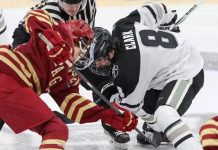The ECAC Policy Committee, the body in charge of granting final approval to a 34-game league schedule, decided during a conference call today to table a final decision until Oct. 1. The delay will allow the Policy Committee members to meet face-to-face amongst themselves and league athletic directors at the annual ECAC AD Convention.

Two months ago, conference athletic directors gave their stamp of approval to increasing the games limit from 32 to the NCAA-standard 34. They also approved the addition of an extra weekend of conference tournament games, in order to facilitate the expansion of the tournament to include all 12 league teams.
Both decisions were made pending approval of the Policy Committee, an oversight body comprised of non-sports representatives from each league school. Given the unprecedented cooperation among Ivy and non-Ivy League athletic directors, passage from the Policy Committee has been expected.
Is this delay an indication that those proposals are in jeopardy?
Not necessarily, said ECAC assistant commissioner Steve Hagwell, who said the delay was inspired more by a desire to meet face-to-face.
“Certainly there were some concerns [during the conference call] on the significance of these proposals,” said Hagwell. “But, also, these people haven’t gotten together in some time. Many of them have never met.
“The last issue they had to decide was in 1998, on whether to go to a 10-team tournament. They conducted that vote via e-mail. …
“I’m optimistic that, given the two months we now have, and the face-to-face opportunity the ADs will have … they will come to that meeting and have their questions already answered, and see that it’s in the best intersts of league.”
The increase in the games limit was a source of great optimism, given that the 12 ADs agreed on the proposal unanimously, even though Ivy League schools would still be limited to 29 games.
The question is whether this spirit of cooperation, and desire to “do what’s best for the league,” is shared by the non-sports representatives.
“One [Ivy League committee member] said that on the [conference] call,” Hagwell said. “They said, ‘We don’t want to get into a situation where we create a divide, us vs. them.’
“So, they’re well aware of that desire to have this league function as a league.”


